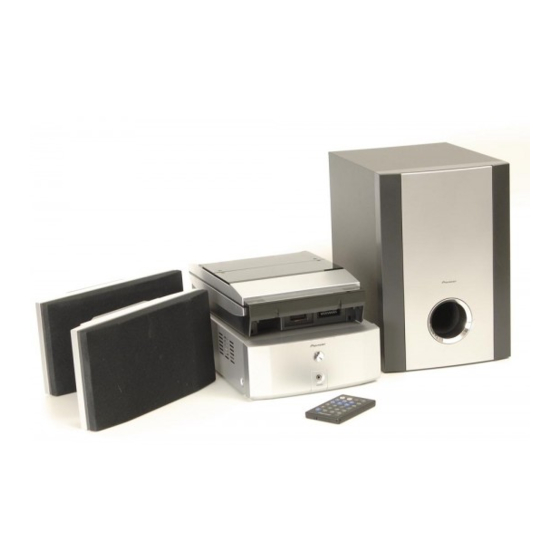Pioneer CT-F10 Operating Instructions Manual - Page 34
Browse online or download pdf Operating Instructions Manual for Amplifier Pioneer CT-F10. Pioneer CT-F10 40 pages. Stereo cassette deck
Also for Pioneer CT-F10: Service Manual (28 pages), Supplementary Operating Instructions (21 pages), Servise Manual (28 pages)

When holding CDs, take care not to leave fingerprints, dirt or
scratches on the disc surface. Hold the disc by its edge or by
the center hole and edge. Damaged or dirty discs can affect
playback performance. Take care also not to scratch the label
side of the disc. Although not as fragile as the recorded side,
scratches can still result in a disc becoming unusable.
Should a disc become marked with fingerprints, dust, etc.,
clean using a soft, dry cloth, wiping the disc lightly from the
center to the outside edge as shown below. If necessary, use a
cloth soaked in alcohol, or a commercially available CD
cleaning kit to clean a disc more thoroughly. Never use
benzine, thinner or other cleaning agents, including products
designed for cleaning vinyl records.
Although CDs are more durable than vinyl records, you
should still take care to handle and store discs correctly. When
you're not using a disc, return it to its case and store upright.
Avoid leaving discs in excessively cold, humid, or hot
environments (including under direct sunlight).
Don't glue paper or put stickers on discs, or write on them
using a pencil, ball-point pen or other sharp-tipped writing
instrument.
CDs spin at high speed inside the player during playback. If
you can see that a disc is cracked, chipped, warped, or
otherwise damaged, don't risk using it in your CD player—
you could end up damaging the unit.
This system is designed for use with conventional, fully
circular CDs only. Use of shaped CDs is not recommended.
Pioneer disclaims all liability arising in connection with the
use of shaped CDs.
The tape of a cassette is quite easily damaged and loose tape
can jam in the tape deck mechanism. If the tape has become
unwound, use a pen or pencil to wind it back on to the spool.
When not using cassettes, always store in the case. Store
cassettes away from magnetic fields, excessive heat, humidity,
dust or oil.
Before recording on a tape, wind the tape on past the leader
tape (about the first 3 or 4 seconds of each side).
Since tapes longer than 90 minutes are so thin, they are more
susceptible to jamming in the tape deck mechanism and
other trouble such as irregular winding. Avoid using cassette
tapes longer than 90 minutes.
